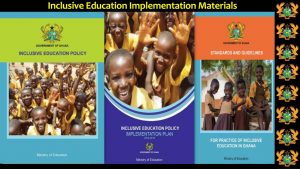INCLUSIVE EDUCATION POLICY FOR CHILDREN WITH DISABILITY LAUNCHED


Picture credit: Disability Rights Fund
The celebration of the national children’s day in August each year presents the country with an opportunity to assess how far we have come in promoting the child development agenda. It gives stakeholders the opportunity to measure progress as well as bring them together to build partnership to help enhance the development of children. The theme for this year’s celebration was “Leave no Child behind for Africa’s Development; The Rights for Children Living with Disabilities”. According to the Children’s Act 560 of Ghana, every child has the right to education no matter the situations the child finds himself or herself, either living with disability or not. It is in this light that the country has come up with an Inclusive Education Policy to make all educational arrangement to ensure that all children have equal opportunities irrespective of gender or disability.
Hon. Gifty Twum-Ampofo the Deputy Minister for Gender, Children and Social Protection in her speech at the National Dialogue on the Implications of the Inclusive Education Policy, stated that “It is important to shift in the way we treat disabilities. This view has gradually been replaced by a social view that looks at disabling environments and social structures rather than at the person with disability. Instead of disability being viewed as a short coming on the part of the individual, the focus has now moved to the environment and society as a whole and to the lack of consideration for human difference”. Unlike the special school system which provides education for a small number of children living with disabilities and the other schools which are greater in number providing education for children with no disabilities, this policy aims to redefine the delivery of education to suit all learners to integrate fully in society by providing them with the required knowledge and skills. The policy was launched with two complementary documents; The Costed Implementation Plan and the Standards and Guidelines. The objectives of the policy are to;
- Improve and adapt the systems and structures of the current educational system to respond to the needs of all children;
- Build a universal design for learning/learner friendly school environment that responds to the needs of all children;
- Promote training of a cadre of human resources that are skilled enough to manage the system; and
- Ensure sustainability of inclusive education implementation.
The strategies adopted for the implementation of the policy are;
- Building capacities of teachers and educational managers;
- Screening of school pupils; and
- Sensitisation of key stakeholders.
Implications of inclusive education on children with disability
Implementing such policy on education will guarantee all children irrespective of their disability, equal opportunities to acquire knowledge and skills for the future, making all of them equally capable to participate fully and contribute their quota to the development of their communities and the nation at large. Children with disabilities will learn together with other children so they can learn from each other to appreciate each other’s capabilities and shortcomings to be able to live in peaceful coexistence. All children will also get to learn in their own communities as the special school system, which allows children with disabilities to learn separately will be done away with. In this regard, the child is free to attend any school in his or community without having to move out in search of a special school. At the end of the day, all children will enjoy their rights to learn together without any form of exclusion from enjoying the benefits of education.
Gaps
Children with intellectual disabilities do not write formal exams so a situation where they find themselves in the same class with others who are fit to write exams will pose a challenge in terms of assessment. The curriculum for children with disabilities also has selected topics which may not be applicable to other children. The question is how do we merge the two to ensure that the needs of all children are met since there are no approved or suggested teaching and learning materials in this regard? What happens to the children who are born deaf and dumb? Do they also sit in the same classrooms with the ones who do not have hearing and speech impairment? Are there going to be extra teachers to cater for the special needs of these children in one classroom such that a class will have multiple teachers at a time?
Recommendations
A country ready to implement an Inclusive Education Policy should have its learning environments properly organised to suit the needs of all the learners including those living with disability to ensure the smooth running of the educational process. Parents, communities and teachers should be well sensitised about the educational, social, emotional and psychological needs of the child so that they can make adequate provisions to ensure the wellbeing of all children in school. There should be activities to promote social inclusion and friendship through extracurricular activities to enhance the personalities of the children.
The implementation of the Inclusive Education Policy will surely help the country in its quest to provide education for all its children to equip them with the necessary knowledge and skills to take up the mantle of leadership when the time comes. Nevertheless, the gaps in this policy are important issues that need to be addressed to ensure that the quality of education is not undermined as all children are entitled to not just an education but one of excellent quality.
Jennifer Johnson
Member, CYIB-Curious Minds
